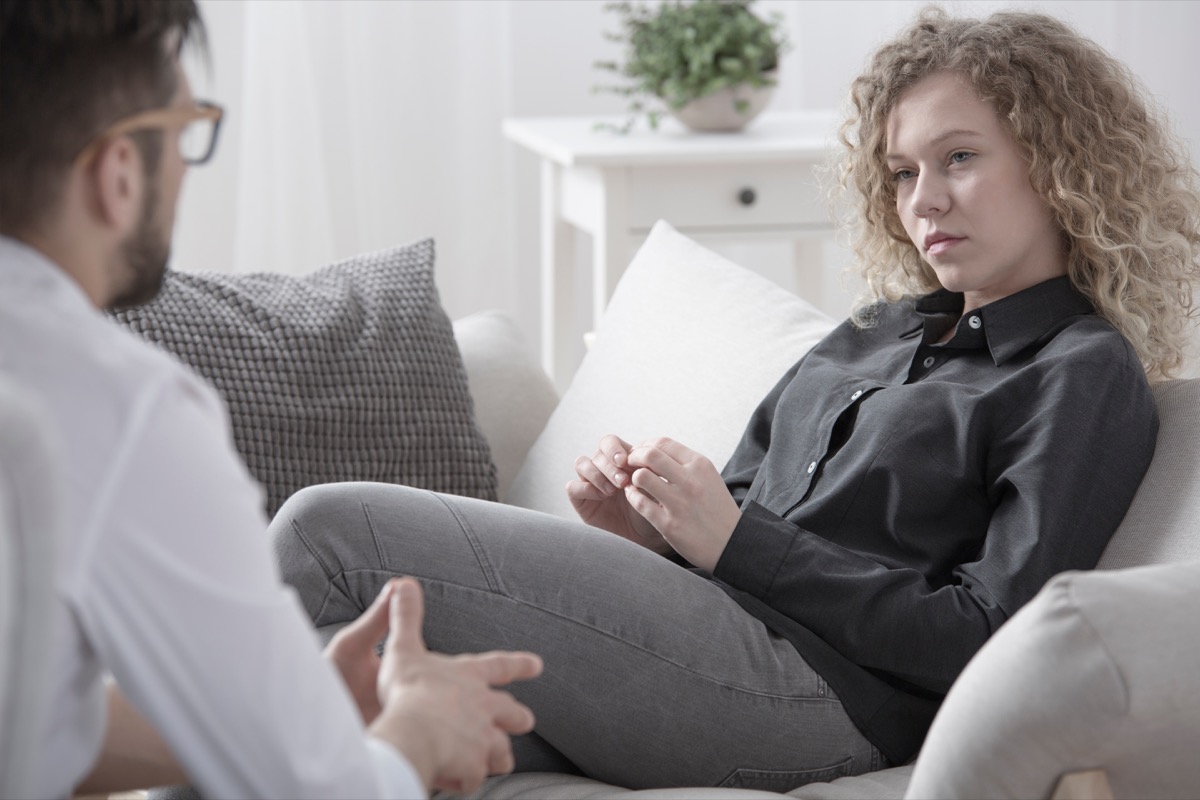The First 7 Things Your Therapist Notices About You

When you first begin therapy, you’ll likely discuss the feelings, questions, and experiences that may have prompted you to begin exploring your mental health. Yet besides the things you say, therapists are also acutely aware of other, unspoken cues during those initial sessions.
“The first session with a client in therapy is a dance of mutual discovery, setting the foundation for a potentially transformative relationship,” says Ryan Sultan, MD, a board-certified psychiatrist, therapist, and professor at Columbia University. “As therapists, while we remain objective, there are several subtle cues and behaviors we notice that give insights into a client’s current state and challenges.”
Wondering which qualities may have piqued your therapist’s interest on day one? Read on to learn the first things your therapist notices about you—in the words of therapists themselves.
RELATED: 7 Body Language Signs That Mean Someone Is Lying, According to Therapists and Lawyers.
1
Body language

Whether you meet with your therapist in person or you do teletherapy online, your therapist is likely to take stock of the subtle cues in your body language.
“One of the most immediate and telling signs is a client’s body language,” says Sultan. “Posture, gestures, and facial expressions can reveal a plethora of information about their current emotional state, comfort level, and openness to the therapeutic process. For instance, crossed arms might indicate defensiveness or anxiety, while constant fidgeting could be a sign of nervousness.”
2
Eye contact

Sultan says that one particularly important aspect of your body language is the frequency and intensity of eye contact.
“The eyes are often referred to as the windows to the soul. Through eye contact, or the lack thereof, therapists can gauge a client’s level of confidence, trust, and readiness to engage,” he explains. “Avoiding eye contact might indicate feelings of shame, guilt, or discomfort, while steady eye contact might reflect an eagerness to connect and communicate.”
Pareen Sehat, MC, RCC, a registered clinical counselor based in Vancouver, Canada, agrees that eye contact can be especially telling. “Inappropriate, intense eye contact might signal deep insecurity. On the other side, avoiding eye contact can show nervousness or a desire to disengage. Rapid blinking can be a sign of stress or distress.”
RELATED: The Hidden Meaning Behind 5 Hand Gestures, According to a Dating Coach.
3
Tone and pace of speech

It’s not just what you say, but also how you say it, says Sultan. Most therapists are likely to notice your tone and pace of speech, and use that information to glean insights about your emotional state.
“The way clients articulate their concerns, the tone they use, and the speed of their speech can provide insights into their emotional state. Rapid speech may signal anxiety, while a slow, hesitant tone could hint at depression or underlying trauma,” Sultan explains.
4
Appearance and self-care

The therapists agreed that appearance and self-care were also likely to get their attention. However, Kelly Minter, LMHC, a mental health counselor based in Florida, assures that this doesn’t typically come from a place of judgment.
“We are required to do an assessment called bio-social-psych, which evaluates things like care in appearance, affect (which generally means attitude), and other things. It clues us into a client’s mental state and potential ability to engage fully,” she explains.
Sultan agrees that physical appearance and presentation can offer clues about one’s state of mind. “While it’s essential not to jump to conclusions based on appearance, noticeable changes in grooming, hygiene, or dress can be signs of various issues, from depression affecting self-care routines to potential socioeconomic challenges,” he says.
RELATED: 5 Things You’re Not Texting Your Partner That Therapists Say You Should Be.
5
Willingness to engage

Another thing your therapist may notice about you in the first session is your level of cooperation and willingness to engage or open up. Oftentimes, people put up barriers despite having reached out for help unprompted.
“The degree to which a client is prepared to participate, share, and explore topics in the initial session offers a snapshot of their commitment to the therapeutic process and potential barriers they might be facing,” says Sultan. “Resistance or hesitancy can be indicative of fear, mistrust, or unresolved traumas.”
Minter says this can be especially significant in the context of couples therapy. “There is often a member of the couple who is more reluctant to engage,” she tells Best Life. “I can tell the difference between someone who takes a while to warm up and someone who is not committed to the idea that therapy can be helpful for them. That is absolutely the first thing I notice.”
6
Reactions to boundaries

Sultan says that a therapist may also notice how you react to structure or boundaries during those first few sessions.
“How a client reacts to the therapeutic setting, especially when boundaries or structures are established, can offer insights into their coping mechanisms and interpersonal dynamics,” he explains. “For instance, someone who becomes defensive or agitated when certain guidelines are set might be struggling with control issues or past authority conflicts.”
RELATED: 5 Ways You’re Coming Off as Untrustworthy, According to Experts.
7
Whether you ask about your therapist

When you first begin therapy, it can be awkward to suddenly find yourself in such an imbalance exchange. Unlike in conversations with your friends, family, and loved ones, this is a space devoted solely to your feelings. Minter says that she often notices when clients feel the need to check in with their therapists, rather than taking that space for themselves.
“It can happen all throughout the first few sessions,” she shares. “Clients who feel they need to attend to their therapist’s feelings are probably people pleasers in their everyday lives, and I know I need to be even more intentional about how I offer information or show support and positive regard so that they don’t feel they have to play that role in my office.”
For more helpful advice sent directly to your inbox, sign up for our daily newsletter.